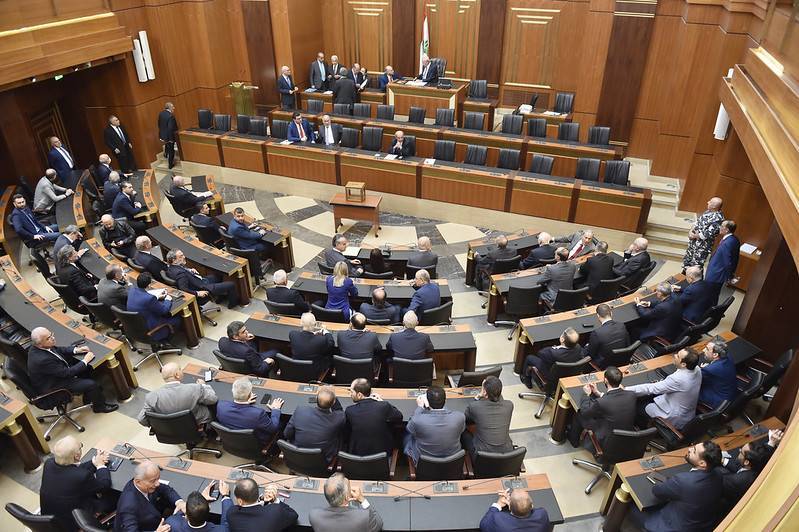
The Lebanese Parliament during a session on October 13, 2022. (Credit: Hassan Ibrahim/Courtesy of Lebanese Parliament)
BEIRUT — With the presidential election deadline looming overhead, Parliament met Tuesday for a legislative session.
The deputies examined the draft law to end Lebanon's banking secrecy policy. The law has been decried by a part of the civil society, who view it as another slap in the face from politicians who they believe will, under misleading pretenses, maintain banking secrecy and thus perpetuate the deplorable condition of Lebanon's banking sector despite the ongoing economic crisis.
Amendment of the banking secrecy law is a prerequisite for the release of a $3 billion financial assistance package from the International Monetary Fund. To unlock the funds, the updated law must meet three objectives: strengthen the fight against tax evasion; bring Lebanon closer to international standards in the fight against money laundering and the financing of terrorism; and optimize the effectiveness of the end of banking secrecy in the fight against corruption.
The first version of the bill, passed on July 26, was returned to Parliament by President Aoun for several reasons. These included ambiguity on the bill's retroactive effects, the fact that it does not clearly state its provisions take precedence over competing laws, and the fact that the actual lifting of bank secrecy remains the exclusive prerogative of the Special Investigation Commission (SIC) under Law No. 32 of October 16, 2008.
Aoun’s refusal to sign the earlier draft was a decision welcomed by the IMF, which publicly criticized the draft. With Parliament’s Tuesday approval of the latest version of the draft law, it will go into effect even without Aoun’s signature.
An end to 'the corrupt'
On the sidelines of assembly discussions, Parliament Speaker Nabih Berri highlighted "the work" of the Finance and Budget Committee and its chairman, Ibrahim Kanaan. He reiterated the need to end banking secrecy so "there are no corrupt people" in Lebanon.
However, during a Monday press conference, the NGO Legal Agenda denounced the bill by claiming the new text only adds ambiguity and complexity to achieve the same objective as the previous draft: to empty the law of its substance.
Those accusations were countered by MP Ibrahim Kanaan prior to Tuesday’s legislative session:
"Most of the information and analyses about the banking secrecy law that are present in some media have nothing to do with reality," he said. "There is an agreement [with the IMF] on most of the points mentioned in this proposed law, except for one important point related to the protection of depositors' personal information and their rights."
During Tuesday’s parliamentary session, Kanaan said he had met several times with members of the IMF "over a period of two weeks" to achieve the requested changes.
Contacted by L'Orient-Le Jour, Kanaan reaffirmed that the draft is "solid" and that the IMF is "satisfied" with it. He said deputies made only "small changes" to the text during the session, including "clearly" mentioning that all judicial bodies have the right to request the lifting of banking secrecy "so as to include the prosecution."
Kanaan rebuffed accusations that he wanted to keep the right to eliminate banking secrecy in the hands of the SIC, chaired by the Bank du Liban (BDL) Governor Riad Salameh, by mentioning that the new draft empowers BDL, the Banking Control Commission (CCB) and the National Institute of Deposit Insurance do so as well, according to their prerogatives.
Additional laws
During Tuesday’s parliamentary session, Lebanese MPs also passed a law instituting a World Bank loan of $150 million to Lebanon to finance wheat imports, to be spent over nine months to help ensure the country's food security.
The loan was offered by the World Bank in early May after the war in Ukraine disrupted global supply chains and halted grain exports leading to wheat shortages in Lebanon.
Although Ukraine resumed grain exports this summer, following an international agreement, the loan was approved by the Council of Ministers just before Lebanon's parliamentary elections on May 15.
The loan was endorsed by Parliament two months later, but amendments required by the World Bank regarding certain implementation modalities had to be approved by the Finance and Budget Committee, which was done in early August.
"The committee wanted clarification on the coordination mechanism with the World Bank and on the payment method, which has since been clarified by the Economy Ministry," caretaker Economy Minister Amin Salam told L'Orient-Le Jour at the time. "Lebanon will repay the WB through the Bank of Lebanon over a period of 18 years."
Parliament also approved a bill that grants Lebanon a loan from the International Bank for Reconstruction and Development (IBRD), a World Bank institution. The loan, worth $29 million — including $6 million in grants — will help the Health Ministry implement a program aimed at preventing, detecting and responding to threats posed by the COVID-19 pandemic, while strengthening the preparedness of the Lebanese national public healthcare system. According to former remarks by MP Fady Alameh in September, Lebanon will repay this loan between 2026 and 2036, with an interest rate of nearly 2.5 percent.
Parliament also approved laws concerning national defense and the Lebanese Army Military Academy.